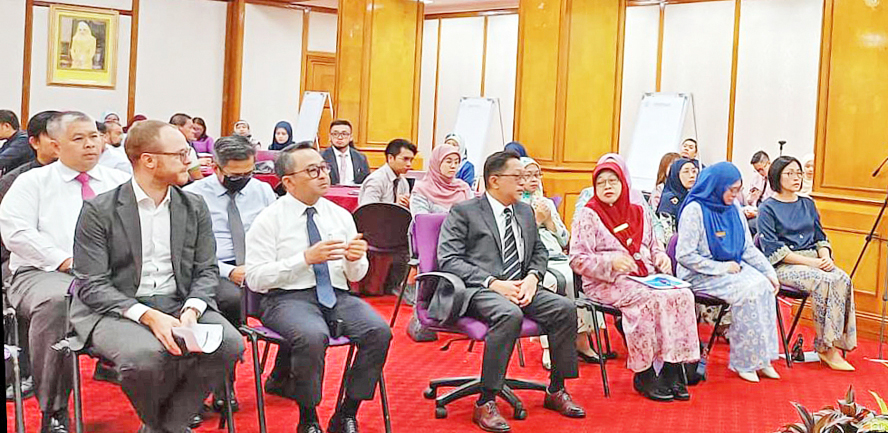Azlan Othman
Globally and regionally, towns and cities are expanding at a rapid rate leading to traffic congestion, bad quality, and infrastructure strain. As urban development authorities strive to build cities that are inclusive, resilient, and environmentally conscious, it is imperative to align all efforts with the principles set forth by the United Nations-Human Settlements Programme (UN-Habitat) and Agenda 2030 frameworks.
Additionally, in the context of ASEAN and Brunei, the ASEAN Sustainable Urbanisation Strategy Framework should serve as a guiding document to shape sustainable urban development strategies.
This was said by Permanent Secretary (Infrastructure, Housing and Professional) at the Ministry of Development (MoD) and Head of the Lead Implementing Body for Sustainable Infrastructure (LIB-SI) Brunei Ir Haji Amer Hishamuddin bin Pehin Orang Kaya Amar Pahlawan Dato Seri Setia Haji Zakaria at the ASEAN Sustainable Urbanisation Strategy (ASUS) workshop at the ministry yesterday.
The permanent secretary said, “I believe by adopting sustainable practices, particularly in the areas of mobility and urban resilience, we can mitigate these challenges and create towns and cities that are livable, resilient, and environmentally friendly.
“In Brunei Darussalam, as with many ASEAN cities, private vehicles dominate our roads, and this has resulted in heavy congestion and putting immense pressure on the road infrastructure.

“As the ideal solution, urban authorities are looking for comprehensive and efficient public transport networks, complemented by accessible and affordable fares that can encourage residents to shift from private vehicles to public transportation, thereby reducing congestion and improving the overall quality of life.”
He added, “Additionally, non-motorised transport options such as cycling and walking are also highly promoted and invested in. For example, in Japan and South Korea, more and more people are choosing to cycle and walk as the governments set priorities to build dedicated cycling lanes and provide pedestrian-friendly zones.
“In Brunei, the development of such cycling lanes and pedestrian facilities are still patchy and ad-hoc. Perhaps if suitable, the workshop can help identify the priority action plans that the authorities can work on in the coming years.
“Besides mobility, we must also focus on enhancing urban resilience. Climate change poses a significant threat to our cities, with predicted rising sea levels, extreme weather events, and increased vulnerability to natural disasters.
“In Brunei, the need for urban resilience is particularly acute. By integrating climate adaptation and disaster risk reduction measures into urban planning, Brunei can strengthen its cities’ ability to withstand and recover from climate-related shocks. This may include investing in robust drainage systems to mitigate flooding, establishing early warning systems, strengthening coastal protection, incorporating green spaces and promoting sustainable building practices.
“Additionally, technology can play a vital role in enhancing urban resilience. The concept of ‘smart cities’ has gained traction in recent years, utilising innovative technologies to improve efficiency and sustainability.
Smart grids, Internet of Things (IOTS), sensor networks, and data analytics can optimise resource allocation, facilitate real-time monitoring, and enhance disaster response capabilities.
“By embracing these technological advancements, Brunei can build towns and cities that are not only environmentally sustainable but also resilient in the face of future challenges.
Sustainable urbanisation is a complex and multi-faceted issue that requires a collective effort from government agencies, businesses, non-governmental organisations and citizens.
“By prioritising sustainable mobility options and enhancing urban resilience, we can create towns and cities in Brunei and the ASEAN region that are not only environmentally friendly but also provide a high quality of life for their people.”
The LIB-SI Brunei, through the Department of Town and Country Planning hosted the workshop, according to the MoD.
LIB-SI Brunei was established to spearhead the implementation of initiatives under sustainable infrastructure of the Master Plan on ASEAN Connectivity 2025 (MPAC 2025).
One of its three initiatives is the development of sustainable urbanisation strategies in Brunei through the dissemination of ASUS locally to national and sub-national agencies.
The workshop aims to encourage the utilisation of ASUS in various national sustainable urban projects, and increase the understanding of the ASUS toolkits and its application in the Brunei context.
Participants learnt about the ASUS framework, discussed its implementation, and explored innovative approaches to sustainable urban development through discussions in breakout sessions.
A panel session is also set for the workshop today with local panellists from Green Brunei, Universiti Brunei Darussalam and Brunei Climate Change Secretariat.
The event has brought together experts and stakeholders from ASEAN member countries to discuss and share best practices in sustainable urbanisation, and provide networking opportunities for the participants which include members of LIB-SI Brunei, multi-sectoral government agencies, and non-government agencies.
The workshop covers priority sub-area topics on mobility and urban resilience over the two days, conducted in collaboration with UN-Habitat.
UN-Habitat Technical Advisor and Project Team Leader Riccardo Maroso and UN-Habitat Sustainable Urbanisation Specialist Tam Hoang are leading the workshop as facilitators, with UN-Habitat specialist speakers sharing expert outlooks on the topics virtually.
As part of ASEAN, the development of ASUS is a critical step and a significant milestone for Brunei, providing a framework to assist the government as well as non-government agencies in advancing sustainable urbanisation locally.
The implementation of the initiatives under MPAC 2025 strategic areas is a crucial step towards achieving sustainable development in ASEAN as a whole.








